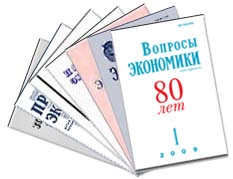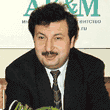Oleg Ananyin, Cand. Sci. (Econ.), professor. National Research University Higher School of Economics, Russian Federation.
Ruslan Grinberg, Corresponding Member, Russian Academy of Sciences, professor. Institute of Economics, Russian Academy of Sciences, Russian Federation.
Natalya Ivanova, Academician, Dr. Sci. (Econ.), professor. Institute of World Economy and International Relations, Russian Academy of Sciences, Russian Federation.
Andrey Kotkovsky (Executive Editor), Cand. Sci. (Econ.). Non-profit Partnership "Voprosy Ekonomiki", Russian Federation.
Yaroslav Kouzminov, Cand. Sci. (Econ.). National Research University Higher School of Economics, Russian Federation.
Vladimir Mau, Dr. Sci. (Econ.), Doctor of Philosophy (PhD), professor. Russian Presidential Academy of National Economy and Public Administration, Russian Federation.
Alexander Nekipelov, Academician, Dr. Sci. (Econ.). Moscow School of Economics, Lomonosov Moscow State University, Russian Federation.
Rustem Nureev, Dr. Sci. (Econ.), professor. National Research University Higher School of Economics, Russian Federation.
Gavriil Popov, Dr. Sci. (Econ.), professor. International University in Moscow, Russian Federation.
Sergey Popov (Executive Secretary), Non-profit Partnership "Voprosy Ekonomiki", Russian Federation.
Vadim Radaev, Dr. Sci. (Econ.), professor. National Research University Higher School of Economics, Russian Federation.
Alexander Rubinstein, Dr. Sci. (Phil.), Cand. Sci. (Econ.), professor. Institute of Economics, Russian Academy of Sciences, Russian Federation.
Dmitry Sorokin, Corresponding Member, Russian Academy of Sciences, Dr. Sci. (Econ.), professor. Financial University under the Government of RF, Russian Federation.
Evgeny Yasin, Dr. Sci. (Econ.), professor. National Research University Higher School of Economics, Russian Federation.
Hisao Kanamori, honorary adviser, Japan Center for Economic Research; chairman of the Board of Trustees, Economic Research Institute for Northeast Asia (Japan).
Grzegorz Kolodko, professor, Transformation, Integration and Globalization Economic Research (TIGER) at Kozminski University in Warsaw (Poland).
Li Cong, Chinese Academy of Sciences (China).
Laszlo Csaba, professor, Central European University and Corvinus University of Budapest (Hungary).
Michael Ellman, emeritus professor, University of Amsterdam (Netherlands).
Michael Emerson, associate senior research fellow, Centre for European Policy Studies (CEPS) (Great Britain).
Publishing ethics is a system of professional standards of conduct governing the relationships between authors, reviewers, editors, publishers, and readers in the course of creating, distributing, and using scientific publications. The policy pursued by the journal
Voprosy Ekonomiki in the field of publishing ethics is based on the guidelines and standards developed by the Committee on Publication Ethics (
COPE).
1. Duties of Editors
1.1. Publication decision. The editor of a scientific journal should be solely and independently responsible for publication decisions, relying on his or her cooperation with the editorial board, the international expert board, and the journal’s editorial office. Editors’ decisions to accept or reject a paper for publication should be based on the paper’s scientific depth and significance. Editors may be guided by the policy of the journal’s editorial board, while being limited by relevant legal requirements with respect to libel, copyright, legality, and plagiarism.
1.2. Impartiality. Editors should evaluate the intellectual content of manuscripts regardless of an author’s race, gender, sexual orientation, religious beliefs, origin, nationality, or political preferences.
1.3. Confidentiality. Editors and the editorial board should not disclose information about submitted manuscripts to third parties, except for authors, reviewers, and other consultants, unless necessary.
1.4. Conflicts of interest and resolution policy
1.4.1. Unpublished data, obtained from manuscripts submitted for review, should not be used in an editor’s own research without written consent of the author. Information or ideas obtained in the course of reviewing, and associated with priority advantages, should be kept confidential and may not be used for personal benefit.
1.4.2. Editors should not consider manuscripts in the event there is a conflict of interest resulting from competitive, collaborative, or other interactions and relationships with authors, companies, and other organizations associated with the manuscript.
1.5. Publication supervision. An editor presenting convincing proof that the assertions and conclusions contained in the publication, are flawed, should notify the publisher accordingly, for the purpose of prompt notification regarding edits, retractions, concerns, and other actions relevant to that particular situation.
1.6. Actions for ethics complaints. An editor should collaborate with the publisher to take adequately responsive measures in the event of ethics complaints regarding reviewed manuscripts or published materials. Such measures generally include collaboration with the manuscript authors and supporting the respective complaint or demand with arguments, and may also require collaboration with relevant organizations and research centers.
2. Duties of Reviewers
2.1. Influence on decisions of the editorial board. Reviewing assists the editor in making adequate decisions regarding publication and, through relevant collaboration with the authors, can also help the author improve the quality of his or her work. Reviewing is an essential link in formal scientific communications, which lies at the heart of the scientific approach. The editorial office shares the view that all scientists wishing to publish their works should participate in peer reviews of submitted manuscripts.
2.2. Diligence. Any appointed reviewer who realizes the inadequacy of his or her qualifications to review the manuscript, or lacks the time to complete the job on time, should notify the editor and request to be excluded from reviewing the respective manuscript.
2.3. Confidentiality. Any manuscript submitted for review should be treated as a confidential document. It should not be discussed with any person who has not been duly authorized by the editor.
2.4. Requirements for manuscripts and impartiality. Reviewers should evaluate texts in an unbiased manner. Personal criticism of the author is inadmissible. Reviewers should express their opinions clearly and reasonably.
2.5. Acknowledgement of original sources. Reviewers should identify significant published papers that are relevant to the subject area but are not included in the reference list of the manuscript. Any assertion (observation, conclusion, or argument) previously published should be referenced in the manuscript accordingly. Reviewers should also draw editor’s attention to any identified material similarities and coincidences between the manuscript under review and any other published paper falling within the scientific expertise of the reviewer.
2.6. Disclosure policy and conflicts of interest
2.6.1. Unpublished data, obtained from manuscripts submitted for review, may not be used in one’s own research without written consent from the author. Information or ideas obtained in the course of reviewing, and associated with possible advantages, should be kept confidential and may not be used for personal benefit.
2.6.2. Reviewers should not participate in reviewing a manuscript in the event of a conflict of interest resulting from competitive, collaborative, and other interactions or relationships with any of the authors, companies, or other organizations associated with the submitted paper.
3. Duties of Authors
3.1. Requirements for manuscripts. Authors should provide reliable results from their work and unbiased judgments regarding the significance of their research. The underlying data should be presented accurately and contain no errors. The paper should contain sufficient details and references for potential reproduction. False or knowingly wrong assertions will be treated as ethical misconduct and are unacceptable.
3.2. Data access and storage. Authors may be asked to provide the raw data referenced in the manuscript to be reviewed and evaluated by the editors. Where possible, authors should be ready to provide open access to that kind of information and, in any case, retain it for a reasonable time period after publication.
3.3. Originality and plagiarism
3.3.1. Authors should make sure that their works are original in all aspects and provide respective references or quotations if they use the works or assertions of other authors.
3.3.2. Plagiarism can come in many shapes and forms, such as submitting another author’s paper as one’s own, copying or paraphrasing key parts of other papers without referencing the authors, or asserting one’s rights for the results of another author’s research. Plagiarism is considered unethical in any form and is unacceptable.
3.4. Multiple, redundant, and concurrent publications
3.4.1. Generally, an author should not publish a manuscript on the same research work as an original publication in more than one journal. Submitting the same manuscript to more than one journal is considered unethical and unacceptable.
3.4.2. In general, authors should not submit articles previously published in other journals.
3.4.3. The publication of a certain type of article (e.g. translated articles) in more than one journal is considered ethical in some cases, subject to a number of conditions. Authors and editors of a given journal may agree to a repeated publication containing the same data and interpretation as the originally published paper. The original paper should be referenced in the second publication.
3.5. Acknowledgement of original sources. Authors should refer to published material for the submitted paper. Data obtained privately, e.g. in a conversation, correspondence, or discussion with third parties, may not be used or presented without written consent of the original source. Information obtained from confidential sources (e.g. in the course of reviewing or evaluating manuscripts to obtain grants) may not be used without written consent of the authors of the paper related to the confidential sources.
3.6. Authorship
3.6.1. Only persons who have made significant contributions to shaping the concept of the paper, researched, executed, or interpreted the submitted work may be considered authors of the publication. All who have made significant contributions should be mentioned as co-authors. Where participants have made a significant contribution to a certain part of a research project, they should be mentioned in the footnote as persons who have made significant contributions to the research.
3.6.2. The author should make sure that all participants who have made a significant contribution to the research are mentioned as co-authors, and that those who have not participated in the research are not mentioned as co-authors, and should make sure that all co-authors have seen and approved of the final version of the paper and agreed for it to be submitted for publication.
3.7. Disclosure policy and conflicts of interest. All authors should disclose in their manuscripts any financial and/or other existing conflicts of interest which may be regarded as having affected the results or conclusions presented in the paper. Examples of potential conflicts of interest subject to disclosure include hired work, consultancy, shareholding, fees, the provision of expert opinions, patent applications or registrations, grants, or other financial security. Potential conflicts of interest should be disclosed as soon as possible.
3.8. Fundamental errors in published papers. Should the author discover material errors or inaccuracies in the publication, he or she should notify the journal’s editors or the publisher, and collaborate with them to retract the publication or to correct the errors as soon as possible. If the editor or publisher is notified that the publication contains material errors by a third party, the author should retract the paper or correct the errors within the shortest time possible.
4. Duties of the Publisher
4.1. The publisher should adhere to principles and procedures which encourage the observance of ethical obligations by editors, reviewers and authors in accordance with these requirements. The publisher should make sure that potential profit from publishing advertisements or making reprints does not affect the editors’ decisions.
4.2. The publisher should support the journal’s editors in their handling of complaints regarding the ethical aspects of published materials, and assist them in collaborating with other journals and/or publishers, if this enables the editors to fulfill their obligations.
4.3. The publisher should facilitate due diligence and introduce trade standards in order to improve ethical recommendations, retraction, and error-correction procedures.

















